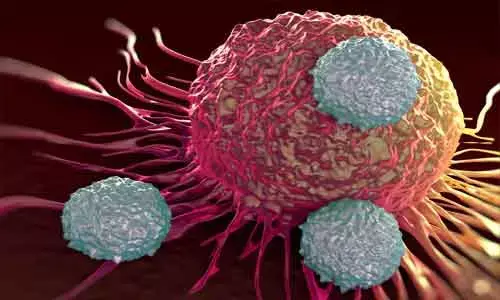- Home
- Medical news & Guidelines
- Anesthesiology
- Cardiology and CTVS
- Critical Care
- Dentistry
- Dermatology
- Diabetes and Endocrinology
- ENT
- Gastroenterology
- Medicine
- Nephrology
- Neurology
- Obstretics-Gynaecology
- Oncology
- Ophthalmology
- Orthopaedics
- Pediatrics-Neonatology
- Psychiatry
- Pulmonology
- Radiology
- Surgery
- Urology
- Laboratory Medicine
- Diet
- Nursing
- Paramedical
- Physiotherapy
- Health news
- Fact Check
- Bone Health Fact Check
- Brain Health Fact Check
- Cancer Related Fact Check
- Child Care Fact Check
- Dental and oral health fact check
- Diabetes and metabolic health fact check
- Diet and Nutrition Fact Check
- Eye and ENT Care Fact Check
- Fitness fact check
- Gut health fact check
- Heart health fact check
- Kidney health fact check
- Medical education fact check
- Men's health fact check
- Respiratory fact check
- Skin and hair care fact check
- Vaccine and Immunization fact check
- Women's health fact check
- AYUSH
- State News
- Andaman and Nicobar Islands
- Andhra Pradesh
- Arunachal Pradesh
- Assam
- Bihar
- Chandigarh
- Chattisgarh
- Dadra and Nagar Haveli
- Daman and Diu
- Delhi
- Goa
- Gujarat
- Haryana
- Himachal Pradesh
- Jammu & Kashmir
- Jharkhand
- Karnataka
- Kerala
- Ladakh
- Lakshadweep
- Madhya Pradesh
- Maharashtra
- Manipur
- Meghalaya
- Mizoram
- Nagaland
- Odisha
- Puducherry
- Punjab
- Rajasthan
- Sikkim
- Tamil Nadu
- Telangana
- Tripura
- Uttar Pradesh
- Uttrakhand
- West Bengal
- Medical Education
- Industry
Antidepressant sertraline may help inhibit growth of cancer cells in lab animals

New research has shown that the antidepressant sertraline helps to inhibit the growth of cancer cells. The substance acts on a metabolic addiction that allows different types of cancer to grow. This is shown by a study on cell cultures and lab animals performed by various research labs of KU Leuven. Their findings were published in Molecular Cancer Therapeutics, a journal of the American Association for Cancer Research.
Cancer cells use different biological mechanisms to stimulate their growth. In certain types of breast cancer, leukaemia, skin cancer, brain tumours and lung cancer, among others, the malignant cells produce large amounts of serine and glycine, two amino acids. This production stimulates the growth of cancer cells to such an extent that they become addicted to serine and glycine.
"This mechanism is an interesting target because cancer cells are so dependent on it", says Professor Kim De Keersmaecker, head of the Laboratory for Disease Mechanisms in Cancer (LDMC). "Healthy cells use this mechanism to a lesser extent and also take up serine and glycine from food. This is not sufficient for cancer cells, however, meaning they start producing more. If we can halt this production, we will be able to fight the cancer without affecting healthy cells."
From yeast to mice
In their search of a substance that influences the synthesis of serine and glycine, the researchers utilized a database of existing medicines. In a first phase, Professor Bruno Cammue's research group at the Centre for Microbial and Plant Genetics (CMPG) tested 1,600 substances on yeast cells.
"Because there are also yeasts, or moulds, which depend on the same mechanism", explains research coordinator Dr Karin Thevissen. "Certain yeasts produce these amino acids to protect themselves against antifungals. In addition, you can easily grow yeast cells, allowing you to test many different substances."
The screening showed that the antidepressant sertraline was the most effective substance. "Other studies had already indicated that sertraline has a certain anti-cancer activity, but there was no explanation for this yet", mention researchers Shauni Geeraerts (LDMC and CMPG) and Kim Kampen (LDMC). "In this study, we've been able to demonstrate that sertraline inhibits the production of serine and glycine, causing decreased growth of cancer cells. We also found that this substance is most effective in combination with other therapeutic agents. In studies with mice we saw that sertraline in combination with another therapy strongly inhibits the growth of breast cancer cells."
Considerable potential
"Now that we've been able to identify this mechanism for breast cancer, we can start examining other types of cancer that are also addicted to serine and glycine synthesis", says Professor De Keersmaecker. "This is for example the case in T-cell leukaemia, but also in certain types of brain, lung and skin cancer. The more tumours we can identify that are sensitive to sertraline, the better the prospects are for helping patients in the future."
"These are, of course, results of experimental research, not clinical studies, but we can be optimistic about the potential. The safety of using sertraline in humans has already been well described, which is a great advantage. That's why we are also looking for industrial partners to develop this further.
https://mct.aacrjournals.org/content/early/2020/11/11/1535-7163.MCT-20-0480
Hina Zahid Joined Medical Dialogue in 2017 with a passion to work as a Reporter. She coordinates with various national and international journals and association and covers all the stories related to Medical guidelines, Medical Journals, rare medical surgeries as well as all the updates in the medical field. Email: editorial@medicaldialogues.in. Contact no. 011-43720751
Dr Kamal Kant Kohli-MBBS, DTCD- a chest specialist with more than 30 years of practice and a flair for writing clinical articles, Dr Kamal Kant Kohli joined Medical Dialogues as a Chief Editor of Medical News. Besides writing articles, as an editor, he proofreads and verifies all the medical content published on Medical Dialogues including those coming from journals, studies,medical conferences,guidelines etc. Email: drkohli@medicaldialogues.in. Contact no. 011-43720751


